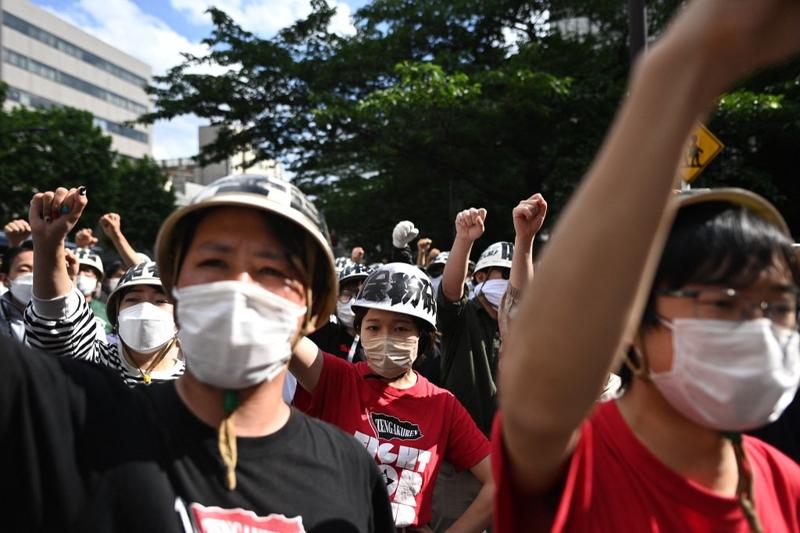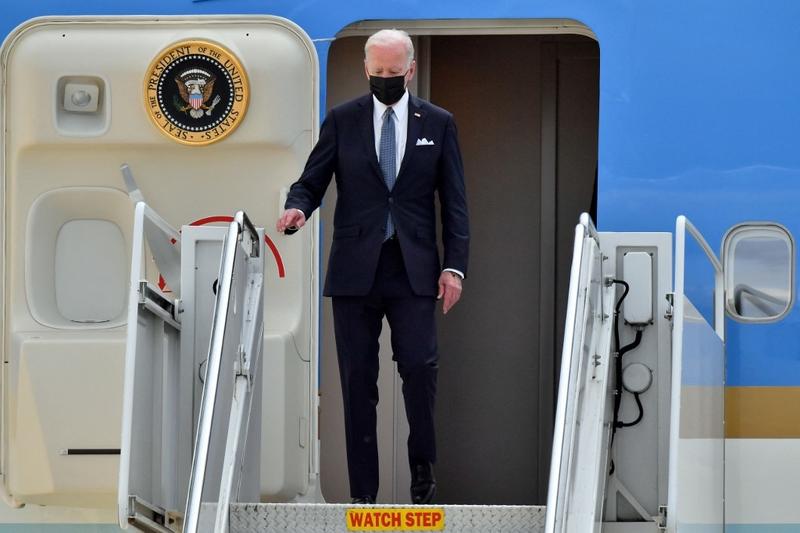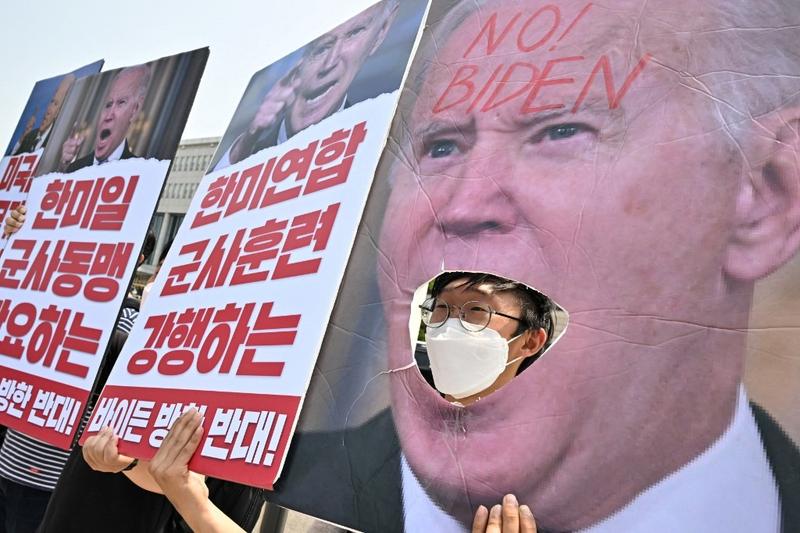 A group of activists chant slogans as they protest against US President Joe Biden's visit to Japan, in Tokyo on May 22, 2022. (PHILIP FONG / AFP)
A group of activists chant slogans as they protest against US President Joe Biden's visit to Japan, in Tokyo on May 22, 2022. (PHILIP FONG / AFP)
TOKYO / SEOUL - US President Joe Biden arrived in Japan on Sunday, as about 750 protesters took to the streets against the planned US-Japan summit and the summit of the Quadrilateral Security Dialogue (the Quad).
A series of meetings are scheduled during Biden's three-day visit to Japan, following his trip to South Korea, including the summit of the Quad group involving Japan, Australia and India, during which the United States is expected to hustle the Indo-Pacific Economic Framework (IPEF).
A series of meetings are scheduled during Biden's three-day visit to Japan, following his trip to South Korea, including the summit of the Quad group involving Japan, Australia and India, during which the United States is expected to hustle the Indo-Pacific Economic Framework
Japanese public opinion, however, seemingly does not favor the IPEF too much.
Japanese media reported that the IPEF has no specific content such as tariff reduction, so it cannot bring visible economic benefits to participating members.
Takakage Fujita, director-general of a civil group dedicated to upholding and developing the Murayama Statement, said in an interview with Xinhua that the United States cooked up the IPEF to use Japan and ASEAN (the Association of Southeast Asian Nations) countries for the benefit of its own.
Fujita said that if the US truly wants to pursue peace and development in Asia, it should follow a coordinated and friendly approach and come up with decent economic ideas.
On Sunday afternoon, around 750 people took to the streets of Tokyo to demonstrate against the upcoming US-Japan summit and the summit of the Quad group.
Tokyo authorities beefed up security and traffic control, mobilizing around 18,000 police officers.
ALSO READ: The brutal truth about Japan and the US
Earlier in South Korea, civic and student activists held rallies against Biden throughout his three-day trip in the Asian country to clamor for peace on the Korean Peninsula.
A group of students from the Korean University Progressive Union on Sunday held an anti-Biden rally near the US military base in Seoul's central district of Yongsan.
"Leave this land, Biden, who escalates a war crisis on the Korean Peninsula," the student activists chanted, raising on their hands the signs opposing South Korea-US joint military exercises and South Korea-US-Japan military alliance.
 US President Joe Biden arrives at Yokota Air Base in Fussa, Tokyo prefecture on May 22, 2022. (KAZUHIRO NOGI / AFP)
US President Joe Biden arrives at Yokota Air Base in Fussa, Tokyo prefecture on May 22, 2022. (KAZUHIRO NOGI / AFP)
"From the day Biden arrived here, university students continued to shout anti-American voices. It reflects the desire of people. Nobody wants war in this land. Everybody wants peace," a student said during the rally.
The student activists went after Biden during his tour, an air base where he arrived and departed for Japan, a hotel where he stayed, and the presidential office where he held talks with South Korean President Yoon Suk-yeol.
The student activists were surrounded by the police, which heightened the security of Biden's visiting locations to the highest level.
One student was taken to a hospital during a tussle on Friday night with policemen who hindered the rally near the hotel Biden allegedly stayed, according to local broadcaster YTN.
ALSO READ: US biolabs in S Korea spark concern
Right before Biden's visit to Seoul, representatives from a total of 155 civic groups held a press conference on Friday, saying the South Korean government should adopt a balanced diplomacy, not a lopsided diplomacy that can bring a new Cold War confrontation to the Korean Peninsula.
If South Korea jumps on the US-centered military alliance, which excludes others, it will negatively affect the Korean Peninsula's peace and denuclearization, while the strengthened military cooperation among South Korea, the United States and Japan will tolerate the rearmament and revived militarism in Japan, the civic activists said.
They urged Yoon and Biden to stop war and confrontation and create an order of peace and co-existence.
The Korean Peninsula has been in a technical state of war as the 1950-53 Korean War ended with an armistice, not a peace treaty.
A series of other peace rallies were conducted by civic and student activists during the US president's stay.
READ MORE: Anger grows in South Korea over US-run labs
The People's Solidarity for Participatory Democracy (PSPD) held a candlelight vigil on Friday near the Gwanghwamun square in Seoul, calling for Yoon and Biden to choose peace rather than military alliance and arms race.
Some 100 peace activists, composed of those from the PSPD and seven other civic groups, staged similar rallies on Saturday near the presidential office in Yongsan, to which the South Korean president relocated his office from the Blue House after taking office on May 10.
 An activist protests against the visit of US President Joe Biden near the presidential office, where he is expected to hold meetings with South Korean President Yoon Suk-yeol in Seoul on May 21, 2022.
(ANTHONY WALLACE / AFP)
An activist protests against the visit of US President Joe Biden near the presidential office, where he is expected to hold meetings with South Korean President Yoon Suk-yeol in Seoul on May 21, 2022.
(ANTHONY WALLACE / AFP)


